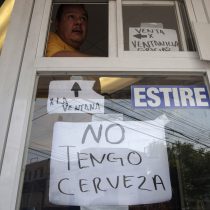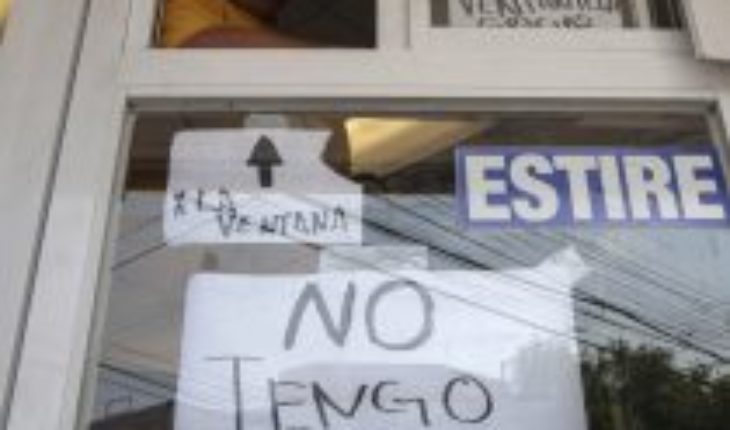
Fernando Rodríguez toured several stores in his neighborhood in Mexico City in search of beer for a virtual party, his only way to celebrate the threat of coronavirus. When he found it, he paid almost double his usual price.
“In a store (…) They had them hidden. They told me they could sell them to me at a much more expensive price. It was one of the last ones they had left,” says Rodriguez, a 33-year-old publicist, to the AFP.
He bought a caguama – a popular 1.2-litre presentation – for 60 pesos (about $2.5), which typically costs about 33 pesos ($1.38).
Its problem is almost widespread in Mexico, where the government ordered the suspension of beer production in the face of the pandemic, which adds 29,616 infected and 2,961 deaths, as a non-essential economic activity.
In some states, specific times were set for sale and distribution. In others, such as Yucatan and Campeche, it even went so far as to order a dry law.
The country’s largest producers, Grupo Modelo – which manufactures the popular Crown and is owned by Belgian giant Anheuser-Busch InBev – and Heineken, with brands such as Tecate and Sol, stopped in early April.
However, Constellation Brands, which manufactures Model Group brands such as Corona and Victoria exclusively for the U.S. market in Mexico, continues to operate, according to Bloomberg.
The AFP attempted to contact Constellation Brands representatives to confirm that information and the status by which it maintains production, but did not get a response.
For a while, stores sold the available inventory, but now their refrigerators are semi-empty and the few remaining ‘chelas’ are overpriced.
In addition to ‘caguamas’, some locals offer cans of 475 ml in 25 pesos (almost a dollar), when they usually cost about 17 pesos (0.71 cents). Still, people buy.
“No problem they consume it, whatever it takes, it’s like cigarette,” says Diana Lopez, 47, a shop owner in a central capital neighborhood.
“It makes me absurd, they complain about the rise in the egg but not the beer,” says Jorge Puente, 33, owner of a grocery store.
#ConLaCervezaNo
Replenishment is no small thing in a country where 70% of households buy beer, according to consultancy Kantar World Panel.
Moreover, Mexico is the fourth largest consumer of this beverage with an average per capita of 68.7 litres per year, according to Kirin Beer University.
After the paralysis, the hashtag #ConLaCervezaNo was imposed on social media, as an informal market flourishes on the internet, especially on Facebook.
“What’s there is a sale that’s already in the hands of speculation, the black market,” says Cuauhtémoc Rivera, president of the National Alliance of Small Merchants, who warns that beer accounts for 40% of the sales of many retailers.
In Tijuana, bordering the United States, some pages offer the product up to three times its original price.
With the promotional “The Last. Anyone who cares,” a user sells 12 beers for 400 pesos (about $16.63), when they usually cost about 120 pesos (almost $5).
These pages offer brands such as Bud Light and Coors, marketed in the neighboring cities of San Ysidro and Otay Mesa, San Diego County, USA, and that residents or Americans can take to Mexico because they cross the border unrestricted.
“There are no beers in the shops, so clandestines abound or we ask a family member because there is (in The United States) there is, and it has always been cheaper,” says Usiel, automotive mechanic.
At the popular Cancun spa, people search the internet for establishments that sell local brands, even though in supermarkets there are low-cost imports such as Belgian Marten’s, and artisanal, usually more expensive.
In Sinaloa, home to the powerful cartel founded by Joaquín “Chapo” Guzmán, authorities have dismantled illegal stores that were created in homes and parking lots to sell beer, as at the time of the alcohol ban in the 1920s in the United States.
In that state on the west coast of Mexico, where temperatures reach these days at 35oC, some adapted the trunks of their vehicles as warehouses to store the drink.
When will there be beer?
According to the Chamber of Brewers of Mexico, in 2018 this country was the fourth largest producer of beer with more than 12 billion liters per year, a million-dollar business.
That is why Grupo Modelo and Heineken claim to be attentive to the green light of the government.
The Federal Consumer Attorney’s Office, an official agency that looks after consumer rights, estimated that production could be revived by mid-May.
“There is strong pressure for the latest reserves,” the agency’s headline, Ricardo Sheffield, told Millennium TELEVISION. “I think in the middle of May they turn on the button.”





